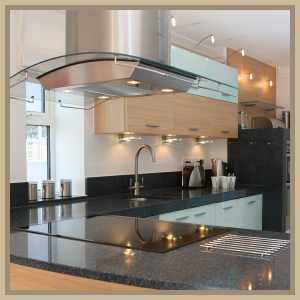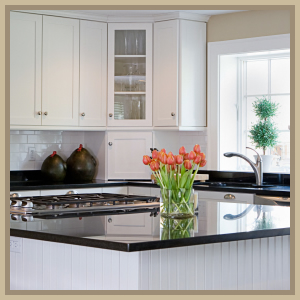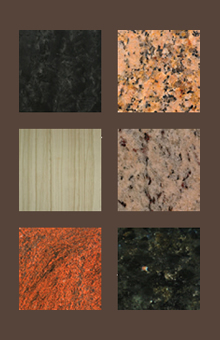


Care & Maintenance of Marble, Granite and Stone Benchtops
With care your new marble, granite and stone benchtops will last a lifetime, by follwing some easy tips and protecting surfaces from heat and spills they will look as good as the day they were installed.
Marble, Granite & Travertine
- Normal ‘Housekeeping’ maintenance involves only periodic washing with clean, tap water and neutral (pH-7) cleaners. “Soap less” cleaners are preferred because they minimize sticking and filming. However, mild phosphate-free, biodegradable liquid dish-soaps, soap flake or powders which contain no aromatics are acceptable if rinsing is thorough.
- Stone surface should be first wetted with clean, hot (not boiling) water. Then, using the cleaner solution, wash in small overlapping sweeps, from bottom-up if a vertical surface. Rinse thoroughly with clean, tap water to remove all traces of soap or cleaners solution change the water in the rinse pail frequently. Dry with soft cloth or cotton-flannel, and allow to thoroughly air-drying. Chamois skin may be used in lieu of cotton cloth in this process.
- Spills of any type should be immediately removed and water-rinsed. Coasters should be placed under all glasses, particularly those containing liquors or citrus juices.
- Hot-plates should be used under heated dishes.
Generally, prevention will save a great deal of time spent on cures and remedies, especially since damages to stone, are often irreparable. Polished stone should receive the same care and consideration that is given to a fine wood finish.
Marble & Travertine
Staining
- Coasters and placemats should be used to prevent staining for all drinking glasses or dishes’, including water glasses as marble is susceptible to all types of stains including water rings. Thus, avoid leaving any spilled substances on marble for any period of time to reduce staining (including juices, alcoholic beverages, oils, greases, cosmetics, and standing water).
- Marble is sealed with penetrating sealer to help prevent the absorption of stains into the stone. Therefore it is recommended that marble be resealed periodically with a penetrating stone sealer on all horizontal surfaces. (Available to purchase at New Millennium)
- Do not use chemical products for cleaning such as acid based, Jif or window cleaner on your new bench top as this can cause a scum build up, eventually taking away the high gloss finish that granite & marble achieves. We at New Millennium have a range of cleaning and maintenance products available to purchase. Please call us for further information.
Etching
- Marble is a calcareous stone and is acid sensitive. Calcareous stones are readily dissolved in acid; therefore acidic products, such as lemon or tomato juices should not be used on marble. These will cause the stone to etch – the surface finish will dull and change texture. Wiping spills immediately and taking caution to use only cleansers specified for stone will help avoid etching your marble.
Burning
- Marble does have the potential to scorch, so hot pots and pans should not be set directly on marble bench tops. Use trivets, potholders and placemats to protect marble surface
- We do not recommend placing very hot items (such as saucepans and oven pots) directly on any stone bench top surface, as this can cause extreme THERMAL SHOCK. Granite is heat resistant up to between 150 and 200 Celsius in temperature; Damage may not be noticed immediately if this is done regularly, however over time hairline cracks may appear reducing the strength of the product.
Others
- Be careful of the weak part of the kitchen bench tops, for example the front & rear of the sink and cook top. Downward pressure to these area’s will cause cracking or breakage.
Granite
Don'ts
- We do not recommend placing very hot items (such as saucepans and oven pots) directly on any stone based bench top surface, as this can cause extreme THERMAL SHOCK. Granite is heat resistant up to between 150 and 200 Celsius in emperature; Damage may not be noticed immediately if this is done regularly, however over time hairline cracks may appear reducing the strength of the product.
- Do not use chemical products for cleaning such as acid like chemicals, on your new bench top as this can cause a build up eventually taking away the high gloss finish that granite & marble achieves.
- Lighter colored granites will be more prone to staining than darker ones. Wiping spills immediately will help avoid most potential staining. Your bench top is sealed with stain-resistant sealer after installation. We recommend regularly re-sealing your granite according to the sealer’s instruction. (Available to purchase at New Millennium)
- Products such as coffee, red wine, cooking oils, butter, lemon juice, tomatoes and anything else acidic should be wiped off the bench top as soon as possible. Take care to use the proper cleaning agents; those that are ammonia based can etch the granite and dull its polish. We at New Millennium have a range of cleaning and maintenance products available to purchase. Please call us for further information.
- While cutting directly on granite surfaces will not affect the large majority of granites, cutting boards are recommended. Repeated use of a knife in the same place on a granite bench top eventually wears down the polish and will blunt your knives.
- Be careful of the weak part of the kitchen bench tops, these are normally; for example at the front & back of the sink and cook top. Downward pressure to these area’s will cause cracking or breakage.
- Although granite is a solid and strong material it will not expand or contract to any measurable degree and therefore should not be subjected to excessive weight, stress or extreme temperatures. This can cause granite to fracture or crack when used as a workbench!
Engineered Stone
The Do's
- Due to its features, CaesarStone requires very little maintenance to keep the surface looking like new. For everyday routine cleaning we recommend wiping the surface with warm soapy water (a mild detergent) and a damp cloth or alternatively use a quality spray and wipe type cleaner.
- To remove adhered materials like food gum and nail polish, first scrape away the excess with a sharp blade. If there are any grey metal marks on the surface, a mild detergent will remove it.
- Household bleach can generally be used as an effective cleaner to remove stubborn marks but care should be taken as some products are considerably stronger than others.
- For removal of extra stubborn dried spills and stains or if you wish to give your CaesarStone bench top or surface a thorough clean then we recommend using cream cleaner and Never Scratch All-Purpose Scrubber which can be used without damaging the stone or alternatively applied to a damp cloth. © CaesarStone
The Don'ts
- CaesarStone will tolerate brief exposures to moderately hot temperatures, however please avoid prolonged contact with very hot pots, pans, electric frying pans and oven trays directly from the hotplate or out of an oven onto the surface of Caesarstone. We always recommend the use of a hot pad or trivet to place hot items onto.
- As with any surface, CaesarStone can be permanently damaged by exposure to strong chemicals and solvents that undermine its physical properties. So, do not use products that contain trichlorethane or methylene chloride such as paint removers or strippers.
- Avoid any highly aggressive cleaning agents like oven cleaner that have high alkaline/PH levels. Should the surface be accidentally exposed to any of these damaging products, rinse immediately with water to neutralise the effects. © CaesarStone
Find out more...

New Millennium Marble & Granite
Unit 1, 6 Charnfield Court
Thomastown Victoria 3074
Tel: 03 9464 0056
Fax: 03 9464 0057



